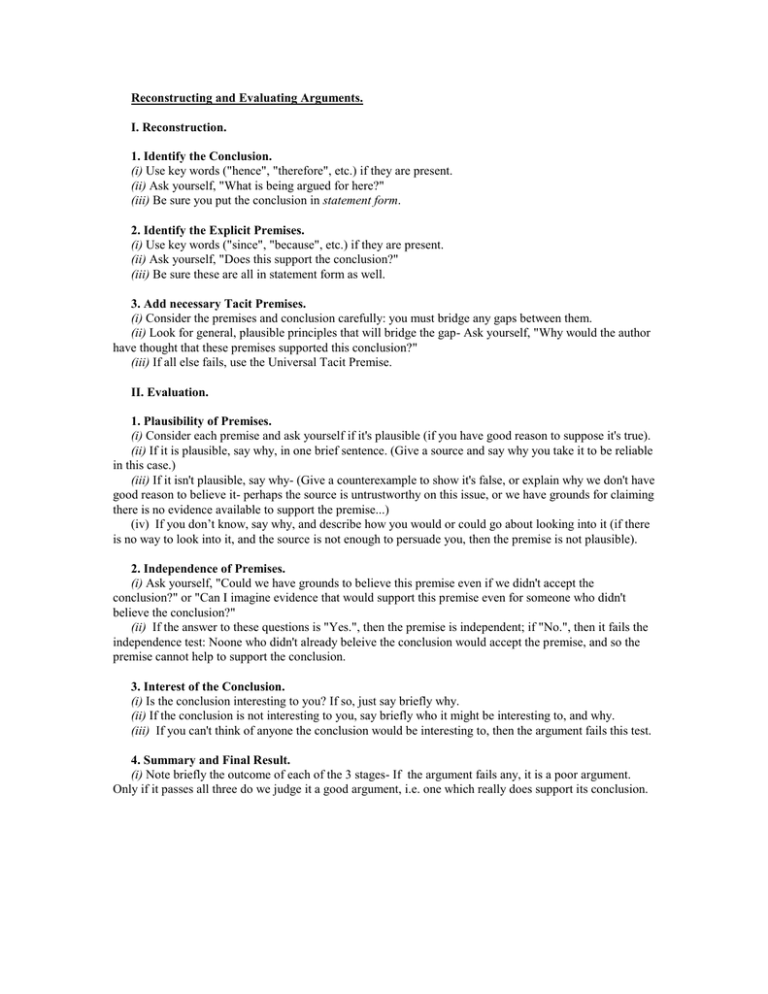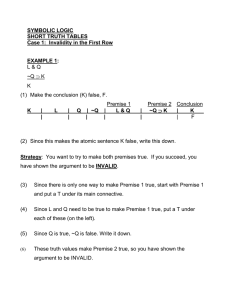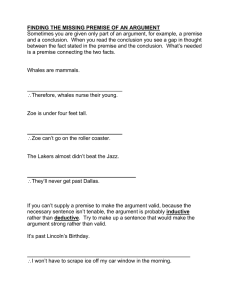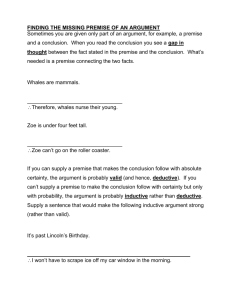Reconstructing and Evaluating Arguments. I. Reconstruction. 1. Identify the Conclusion.
advertisement

Reconstructing and Evaluating Arguments. I. Reconstruction. 1. Identify the Conclusion. (i) Use key words ("hence", "therefore", etc.) if they are present. (ii) Ask yourself, "What is being argued for here?" (iii) Be sure you put the conclusion in statement form. 2. Identify the Explicit Premises. (i) Use key words ("since", "because", etc.) if they are present. (ii) Ask yourself, "Does this support the conclusion?" (iii) Be sure these are all in statement form as well. 3. Add necessary Tacit Premises. (i) Consider the premises and conclusion carefully: you must bridge any gaps between them. (ii) Look for general, plausible principles that will bridge the gap- Ask yourself, "Why would the author have thought that these premises supported this conclusion?" (iii) If all else fails, use the Universal Tacit Premise. II. Evaluation. 1. Plausibility of Premises. (i) Consider each premise and ask yourself if it's plausible (if you have good reason to suppose it's true). (ii) If it is plausible, say why, in one brief sentence. (Give a source and say why you take it to be reliable in this case.) (iii) If it isn't plausible, say why- (Give a counterexample to show it's false, or explain why we don't have good reason to believe it- perhaps the source is untrustworthy on this issue, or we have grounds for claiming there is no evidence available to support the premise...) (iv) If you don’t know, say why, and describe how you would or could go about looking into it (if there is no way to look into it, and the source is not enough to persuade you, then the premise is not plausible). 2. Independence of Premises. (i) Ask yourself, "Could we have grounds to believe this premise even if we didn't accept the conclusion?" or "Can I imagine evidence that would support this premise even for someone who didn't believe the conclusion?" (ii) If the answer to these questions is "Yes.", then the premise is independent; if "No.", then it fails the independence test: Noone who didn't already beleive the conclusion would accept the premise, and so the premise cannot help to support the conclusion. 3. Interest of the Conclusion. (i) Is the conclusion interesting to you? If so, just say briefly why. (ii) If the conclusion is not interesting to you, say briefly who it might be interesting to, and why. (iii) If you can't think of anyone the conclusion would be interesting to, then the argument fails this test. 4. Summary and Final Result. (i) Note briefly the outcome of each of the 3 stages- If the argument fails any, it is a poor argument. Only if it passes all three do we judge it a good argument, i.e. one which really does support its conclusion.



